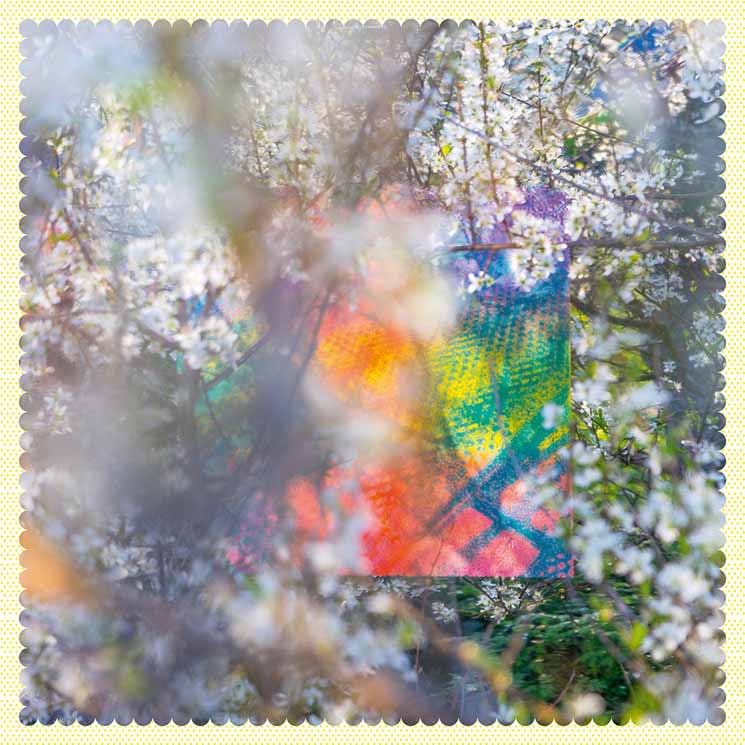Over the course of his storied career, Kieran Hebden (aka Four Tet) has attracted a significant degree of merited attention. By now, he has honed a sound that he can call wholly his own, one often imitated. Even the concept of releasing singles as a teaser to an album is not commonplace for many electronic musicians, but with "Teenage Birdsong" and "Baby," he has done so to great success. Now, Sixteen Oceans has arrived on his own Text Records, and it's all that we've come to expect.
Given a corresponding number of tracks to the title, the purpose may be that each individual composition stands as its own sonic "ocean." "School," could perhaps have fit comfortably on 2017's New Energy. In fact, if a complaint could be made for Sixteen Oceans, it would be that it can feel as though an extra appendage to what New Energy was — not necessarily as their own isolated hubs of sound. That's not necessarily a bad thing, but it can feel as though we miss out on some of the innovation of earlier Four Tet projects.
That being said, the album shines brightest where Hebden unabashedly appeals to emotion, as on the aforementioned "Baby" and "Teenage Birdsong." On the former, the trademark sample work is ever present, and it bounces gleefully atop his now-standard earthy approach to percussion and rhythm. This time, however, the sample is drawn from a collaborative effort with Ellie Goulding — a testament to Hebden's place in the current musical zeitgeist. The latter effort is devoid of vocals of any kind, but it somehow strikes the perfect balance of nostalgia and optimism that is a hallmark of any Four Tet composition.
There are other highlights, of course, from the reasonably eclectic "Love Salad," which resolves satisfyingly at its conclusion, or "Bubbles at Overlook 25th March 2019," which comes closest to invoking is form on Rounds. As the album rounds off, the rhythms become less present, and the compositions more cerebral, signalling a composed denouement that feels a bit like a lullaby.
Sixteen Oceans is a sign of Hebden settling into his well-trodden niche. Occasionally, one can wish for the unbridled eclecticism of his earlier days, but that doesn't seem to be of any concern for an artist who is in complete contentment of his place in the musical world. The final track of the album is probably the biggest clue into his mindset: "Mama Teaches Sanskrit." Within it, a female voice recants a Sanskrit mantra that speaks of completeness and peace. Perhaps that's the point of his music, then, to make people feel complete, and to make people feel at peace.
(Text Records)Given a corresponding number of tracks to the title, the purpose may be that each individual composition stands as its own sonic "ocean." "School," could perhaps have fit comfortably on 2017's New Energy. In fact, if a complaint could be made for Sixteen Oceans, it would be that it can feel as though an extra appendage to what New Energy was — not necessarily as their own isolated hubs of sound. That's not necessarily a bad thing, but it can feel as though we miss out on some of the innovation of earlier Four Tet projects.
That being said, the album shines brightest where Hebden unabashedly appeals to emotion, as on the aforementioned "Baby" and "Teenage Birdsong." On the former, the trademark sample work is ever present, and it bounces gleefully atop his now-standard earthy approach to percussion and rhythm. This time, however, the sample is drawn from a collaborative effort with Ellie Goulding — a testament to Hebden's place in the current musical zeitgeist. The latter effort is devoid of vocals of any kind, but it somehow strikes the perfect balance of nostalgia and optimism that is a hallmark of any Four Tet composition.
There are other highlights, of course, from the reasonably eclectic "Love Salad," which resolves satisfyingly at its conclusion, or "Bubbles at Overlook 25th March 2019," which comes closest to invoking is form on Rounds. As the album rounds off, the rhythms become less present, and the compositions more cerebral, signalling a composed denouement that feels a bit like a lullaby.
Sixteen Oceans is a sign of Hebden settling into his well-trodden niche. Occasionally, one can wish for the unbridled eclecticism of his earlier days, but that doesn't seem to be of any concern for an artist who is in complete contentment of his place in the musical world. The final track of the album is probably the biggest clue into his mindset: "Mama Teaches Sanskrit." Within it, a female voice recants a Sanskrit mantra that speaks of completeness and peace. Perhaps that's the point of his music, then, to make people feel complete, and to make people feel at peace.
